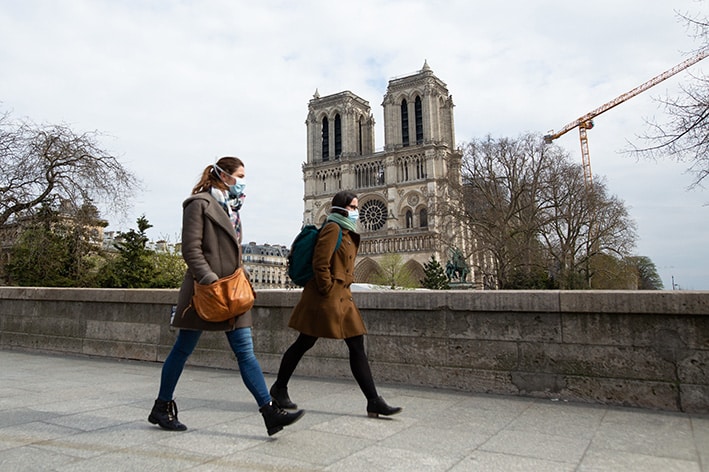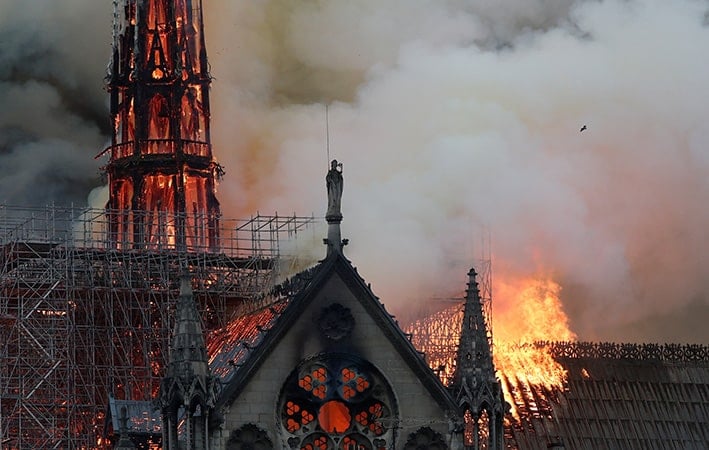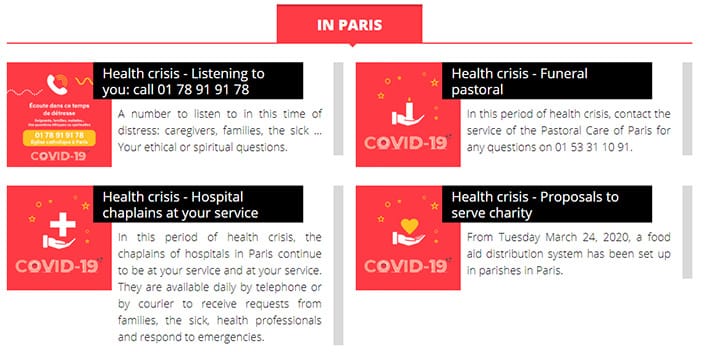
A Church that refuses to be passive
Archbishop Michel Christian Alain Aupetit of Paris does not believe that he or the Church should remain hidden or passive during the worldwide Covid-19 quarantine. Indeed he has overseen two epoch-making upheavals: the 2019 fire in Paris’ mother church, Notre Dame de Paris and the current Coronavirus pandemic. In each, he has found opportunities to signal Catholic hope and faith not only to Catholics, but all people in his city and throughout France.
In meetings with French President Emmanuel Macron he has insisted that although the Cathedral of Notre Dame is owned by the State, her restoration must focus upon her place as the “soul” of Catholic “worship and praise of God” for the salvation of humanity. He has called her the “common home” of all France and a “ship” which carries all on pilgrimage to the heavenly Jerusalem.

France’s deadly Coronavirus cost
France has been hard hit by the Coronavirus pandemic. As of 24 April there have been over 124,114 cases of infection and over 22,000 have died.
With a population of over 11 million, the greater Paris region has experienced over 5500 deaths while nearly 2,000 people remain hospitalised with serious coronavirus symptoms. Some have been moved to hospitals outside the city. To date, the French death rate from the virus is something like 32.6 per 100,000 while Australia’s rate is less than 3 per 100,000).
The archdicese also faces serious challenges in its charitable work, with many at high-risk in the city and in the banlieue (poorer suburbs) beyond.
Paris has many homeless people and undocumented migrants while the homebound remain cooped up in high-rise apartments. People in these situations who work are the most exposed to infection as cleaners, delivery drivers and other “front-line” services. The Archdiocese works with an extensive network including the St Vincent De Paul Society, the Order of Malta and the Catholic Scouts as well as many parishes in order to provide visits and the distribution of clothing and hot meals.
The doctor who became Archbishop
Prior to becoming a priest, Archbishop Aupetit qualified as a Doctor and worked in general practice. He also lectured in bioethics and wrote extensively on the subject. With the Bishops of France he opposed new laws to extend reproductive technology such as IVF. Over 40,000 people supported this position, protesting in support of a child’s right to a family through the streets of Paris.
The Archbishop has brought his medical training to bear in his negotiations with the French government working on “sanitaire” protocols for visitations, especially to the nursing homes, where large numbers of the elderly and disabled have been isolated from their families and from adequate care. Archbhishop Aupetit has condemned the ethics “of eugenics” and the suffering caused by the lack of ecclesial and family contact and has enlisted over 40 volunteer priests to ensure that these people are able to receive the sacraments and have news from their families.
The Archdiocese of Paris has in some cases been able to keep churches open for limited private prayer and has set up a telephone hotline for advice on ethical and spiritual questions.

The Archbishop and the 106 parishes of Paris have deployed social media, radio, musicians and artists to assist in live-streamed masses, the Divine Office and other devotions. Throughout the crisis Archbishop Aupetit has remained a highly visible presence, reviving in new ways the long history of the faith in the city of Paris, its acts of charity and his own preaching.
On the morning of Good Friday, he led a tiny group in meditation and veneration, within the damaged Cathedral, confronting the Coronavirus with the “Corona” of Christ, the relic of the Christ’s Crown of Thorns. The televised event served as a signal of the reinstatement of Catholic faith and culture within the august building, and enlisted a French violinist and three actors reading meditations by great Catholic French writers including Charles Péguy, Georges Bernanos as well as Mother Teresa.
On Holy Thursday, the Archbishop also blessed all of Paris with the Blessed Sacrament from the summit of Montmartre. Benediction like this was repeated throughout Paris and France.
Unnerving secularists
There are signs that all this Catholic visibility and liturgy may be getting on the nerves of some secularists in Paris. On Divine Mercy Sunday, three armed French police, apparently alerted by a suspicious “neighbour” burst through the closed doors of Church of Saint André de L’Europe, demanding that the priest stop the celebration of the broadcast Mass which was accompanied the Church’s renowned organ.
Thisw as despite the facts that the church was confinement-compliant, being closed to the public and assisted only by the organist, a server and three lay readers.
Abbé Philippe de Maistre, the very engaged young parish priest, tried to ignore the interruption but, he later said, the police demanded that the participants “verbal” him to stop the Mass. Like a scene from a French comedy, Fr De Maistre’s altar server (also a policeman) engaged in a lively negotiation with the invading gendarmes, who nonetheless demanded that some of the small party return home immediately. The Abbé immediately reported the incident to the town hall and to his Archbishop.
A church prepared to bark
Archbishop Aupetit condemned the intrusive behaviour of the police and backed his priest. On his regular radio segment on Radio Notre Dame he said: “Il faut garder la tête froide et arrêter ce cirque” – which might be colloquially translated as “Stay calm and DON’T carry on!” or, more literally, “We need to be on guard with a cool head and stop this circus!’
He warned that religious freedom was not to be threatened by the State, especially in cases such as that in Saint Andre – where the priest was not breaking the Covid restrictions and was clearly adhering to social distancing and other measures.
Aupetit said the Church would speak up against such abuses and if pressed would “aboyer très fort” – would bark loudly.
Related
• Online Pilgrimage Program for Catholics during COVID-19
• French Catholicism after the Notre Dame conflagration
• Joint vow to rebuild Notre Dame
